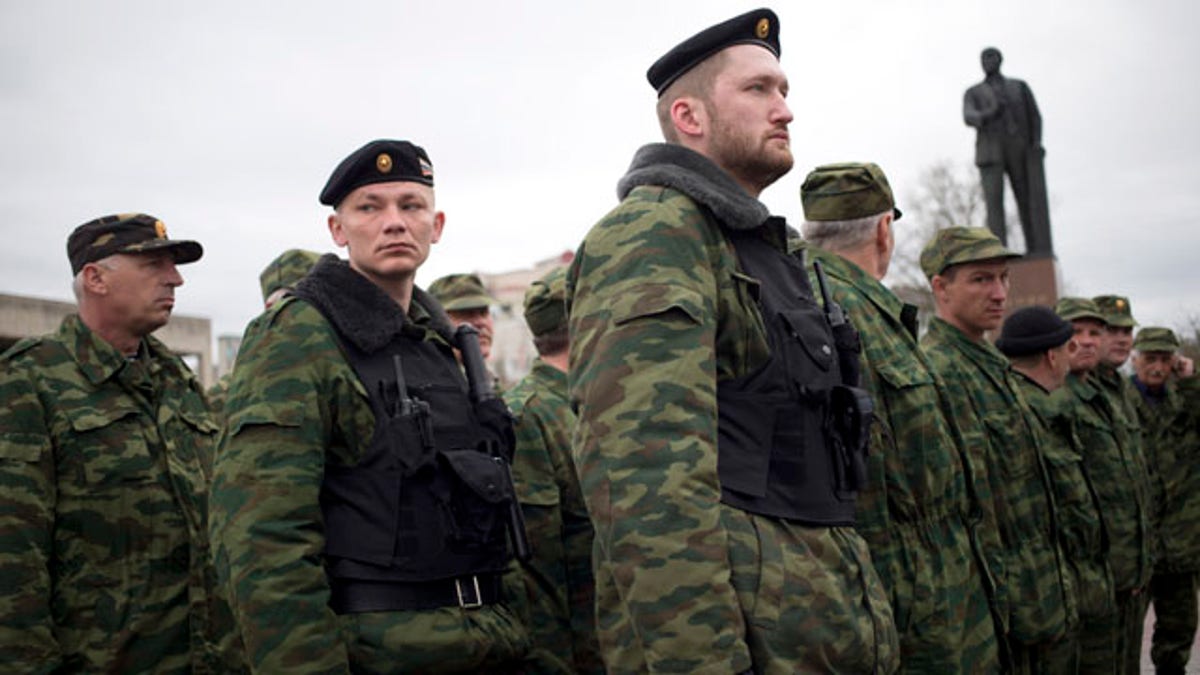
March 27, 2014: Members of the Crimean self defense forces gather for their morning briefing prior to patrolling the city at Soviet Union founder Vladimir Lenin's statue in Simferopol, Crimea. Crimea's government has decided to disband self-defense forces which provided help to the Russian military which have been occupying since late February. (AP Photo/Pavel Golovkin)
Yulia Tymoshenko, former Ukrainian prime minister, announced Thursday that she will run for president.
Tymoshenko, who was released from jail last month following the overthrow of President Viktor Yanukovych, returns as one of the most polarizing figures in Ukraine's political scene.
The vote is set for May 25.
"I will be the candidate of Ukrainian unity," the 53-year-old Tymoshenko said. "The west and center of Ukraine has always voted for me, but I was born in the east, in Dnipropetrovsk."
This will be her second attempt to secure the presidency -- she narrowly lost to Yanukovych in 2010.
Once Yanukovych was in power, Tymoshenko was brought to trial and convicted of abuse of office for negotiating a 2009 deal for Russian gas imports at an allegedly excessive price. The trial was widely seen as a political vendetta, but the gas deal and Russian President Vladimir Putin's comments that he found Tymoshenko easy to work with shadowed her image with many Ukrainians.
Tymoshenko struck a hostile stance toward Putin on Thursday, saying she considers him "the No. 1 enemy of Ukraine."
Her return to the forefront of public life brings back one of the most divisive figures in Ukraine's political scene. She is variously admired as an icon of democracy and detested as a self-promoting manipulator with a shady past.
Long before achieving political renown, Tymoshenko was already a high-profile figure in Ukraine. She and her husband took early advantage of former Soviet leader Mikhail Gorbachev's perestroika reforms by creating a popular video rental business.
The couple founded a fuel distribution company and she became head of Unified Energy Systems, a wholesale broker of natural gas. In that post, she became one of Ukraine's richest and most powerful oligarchs -- and was dubbed "The Gas Princess."
With her blond braids and telegenic smile, Tymoshenko came to international prominence in the 2004 Orange Revolution, mass protests that culminated with the overturning of a widely criticized election that had given Yanukovych the presidency.
A re-run of the election handed the presidency to her political ally Viktor Yushchenko, under whom she served as prime minister. However, Yushchenko and Tymoshenko quarreled extensively, leaving the government near-paralyzed at times, and broad voter disappointment helped Yanukovych win the presidency in 2010.
Tymoshenko said Thursday she would not squander voters' trust this time around.
"I will do everything to ensure that our second European revolution does not lead to distrust, depression and disappointment," she said. "I will everyday work to earn the trust that is afforded to me by the people."
Tymoshenko is the best known of an array of potential new candidates in a race left wide open by Ukraine's political upheaval, ranging from former heavyweight boxer Vitali Klitschko to politicians who have their political base in the eastern provinces.
Yet a survey conducted in mid-March by the SOCIS polling organization found Tymoshenko getting only about 12 percent support among likely voters. The top figure, by a wide margin with 36 percent, was chocolate magnate and former foreign minister Petro Poroshenko, whom many expect to declare his candidacy before registration concludes on Sunday.
"I am certain that if Poroshenko wins that I, as a person who wants the good of Ukraine, will protect the unity of democratic forces and will support all real reforms and the transformation of our country," Tymoshenko said.
The International Monetary Fund pledged up to $18 billion in loans on Thursday to prop up Ukraine's teetering economy, and the prime minister warned that everyone is going to feel some pain from the necessary financial reforms ahead.
In a lengthy, passionate address to parliament, Prime Minister Arseniy Yatsenyuk warned that Ukraine was "on the brink of economic and financial bankruptcy" and laid out the fixes needed to put the country back on track.
"The time has come to tell the truth, to do difficult and unpopular things," Yatsenyuk said. "The country is short 289 billion hryvnia ($25.8 billion), which is practically equivalent to the entire state budget for this year."
The IMF loan, which is expected to range between $14 billion and $18 billion, hinges on structural reforms that Ukraine has pledged to undertake.
Ukraine's Finance Ministry has said it needs $35 billion over the next two years to avoid default.
One immediate reform will be to allow gas prices for households to float upward to be more in line with market prices. Ukraine for years has relied on discounted gas from Russia and then subsidized that further, so that residents are used to extremely low energy prices. Russia has abandoned the discounts and Ukraine's government cannot afford the extra subsidy anymore.
Prices for gas and heating have to be raised "to full cost recovery," the IMF said.
Yatsenyuk also announced layoffs for 10 percent of Ukraine's civil servants, or 24,000 workers.
Other donors, including the European Union and Japan, have already pledged further aid to Ukraine, conditional on the conclusion of an IMF bailout and reform package. The total amount of international assistance will be about $27 billion over the next two years.
Separately, the 28-nation EU has prepared a wider aid package, including loans and grants for Ukraine expected to total more than $10 billion over the coming years.
The White House welcomed the IMF loan announcement, calling it a "powerful sign of support from the international community for the Ukrainian government."
The Associated Press contributed to this report.
